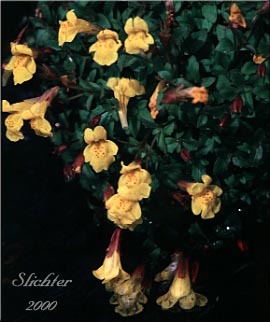 Large mountain monkey flower as seen hanging from the side of a seep at Soda Creek
along the Todd Lake to Green Lakes Trail, Three Sisters Wilderness........August
22, 1991.
Large mountain monkey flower as seen hanging from the side of a seep at Soda Creek
along the Todd Lake to Green Lakes Trail, Three Sisters Wilderness........August
22, 1991.
Large mountain monkey flower is an attractive perennial which is similar in appearance to Mimulus guttatus. It differs from the latter in being much shorter (5-20 cm high) and usually having single flowers at the tips of the stems (although 1-5 may be found). The herbage is commonly smooth or occasionally slightly hairy. The leaves are either sessile or with short petioles. The blades are rhombic, elliptic, or ovate in shape and usually less than 2.5 cm long. The leaves are usually the same size from the lower to upper stem, and most commonly have several irregular, small teeth on the margins.
The inflorescence consists of solitary or occasionally up to 3 flowers on long pedicels. The flowers are large for the size of the plant, with the tubular yellow corollas from 2-4 cm long. The throat is often somewhat closed and contains 2 hairy red- to brown-spotted ridges. The calyx is 1.5-2 cm long with the upper tooth longer than the others. The anthers are glabrous.
Large mountain monkey flower is a plant of wet places at high altitudes in the mountains. It is especially found in or along small cold streams or at seeps.
Large mountain monkey flower may be found in mountainous areas from British Columbia south to northern Baja California and east to Alberta and south through the Rocky Mountains to New Mexico.